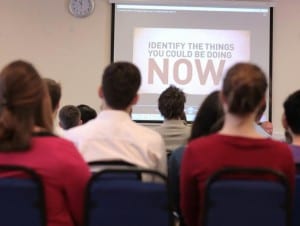Five Common Mistakes in Job Applications – and How To Avoid Them
By Weronika Z Benning, on 22 September 2016
We’ve all been there. You sit for days and days, snuggled under your duvet, shooting off job applications. Out of fifty apps, you get seven responses – all rejections.
This is the reality of life after uni – or, for the proactive among us, final year. In a world where twenty people apply for every skilled job, half of them good enough for the role, what can make you stand out? And what are you doing wrong?
Here’s five common mistakes you could be making.
You don’t know what you’re applying for
This is the most common reason for rejection from a job. “Graduates and those seeking to further their careers often pay 99% of their attention to the big things on their CVs – their academic performance, employment history, achievements and so forth,” says employment expert Lillian Bususu. “But those things mean little when a company receives a CV addressed to the HR manager of their rival.”
For every single application, you must change your approach. Do your research; Google is there for a reason. Customise your CV, covering letter and the skills you advertise. 36% of employers reject copy/paste applications, and 14% turn you down for a lack of research. Don’t give them the excuse.
So repeat with me: “I would love to work at [insert company name here] because…”
Your CV isn’t up to scratch
How hard is it to write a decent CV? Very – or so anecdote suggests. HR and recruitment officials are always complaining about CV quality. So how can you put yours in the ‘good’ camp? Firstly, typos. It’s possible that you’re making the language mistakes this Guardian article seeks to eliminate. Check over your resume and amend where necessary.
Secondly, your formatting – is it professional? There are no real rules for CVs, which makes it harder in many ways. You want a recruiter to look at your document and go: “That looks like a serious, organised person.” Emojis and star-shaped bullet points are not your friends. Here’s an example of a grad CV format from the National Careers Service – or look at these from the Guardian. It’s best to design your own – originality, etc – but nobody will sue you for getting ideas from a template. Submit PDFs rather than Word docs where possible, to preserve your beautiful layout. And for the love of Miley, don’t go over two pages. Lastly, don’t sell yourself short. It’s easy to get caught up on what to include and what not to. But if you put everything in and order it well, nobody’s going to fault you.
You don’t have the experience
Your first job will always be the hardest to get. Universities may be stressful and work-heavy and possibly even impressive on a CV, but they are not work. They don’t prepare you for the rigmarole of the commute, the necessity of attendance and often rigid hours of an actual workplace. In fact, the only guarantee that a graduate can hold up in a real job is if she has had one before.
“But I’m only just out of university!” you cry. “I can’t have had a job!” True – but other applicants will have internships, part-time roles and volunteer experience to their name. They’ll have worked gap years and done summer placements. The more of this you have – whatever the industry or role – the more likely you are to be looked on favourably by an employer.
So, if you haven’t already, get out there. If your interviewer asks, “What are you doing at the moment?”, you need to be able to respond. Volunteer, build a website or tutor some local schoolkids. Sign up for a short course or online tutorials while you’re job-searching. There’s work out there for everyone.
You’re not using all your resources
Ever heard of hidden skills? If not, you might be overlooking your most employable attributes.
Hidden skills are abilities you have but don’t recognise. Are you always the one to organise outings and trips for your group of friends? That is people-management experience right there. This handy website can help you convert other activities into excellent CV and interview babble.
Additionally, you know those rejections you get? You can reply, you know. Follow up on rejections.
Generally, employers are open to giving feedback. This valuable tool, which so few jobseekers use, is a good way to identify the failures in your applications and improve future chances.
Finally, remember that you are a multifaceted person. You have lots of skills and could work in many different industries or positions. Spread your search – if one approach isn’t working, try applying for other roles. Want a job in marketing? Try applying for social media and content writing positions. They’re great experience that can strengthen a marketing CV in the future.
You’re not tied to your first grad job; switching industries and roles is commonplace. Concentrate on getting your foot on the ladder for now. The dream job can come later.
You’re too… young…
This is a hard one to accept. Millennials – those born between 1980 and 2000 – are not well-liked in the working world. We are unemployable and undesirable. Though we boast the technological hard skills required for many jobs, we lack soft people and business skills.
So you must work against your stereotype. If you look at the words ‘soft skills’ and frown, fix this issue. Don’t be yet another Gen Y recruit with no idea what the term ‘icebreaker’ means. It’s tough out there for our generation, but it’s not impossible.
Finally, it’s a numbers game. Apply to five jobs? Expect to hear nothing. Apply to five hundred? That’s more like it. Stay motivated and remember: you’re not alone. And if it all goes to pot, you can always write your CV on a sign and go for a walk.
Inspiring Interns is a graduate recruitment firm which specialises in sourcing candidates for internship jobs and giving out graduate careers advice. To hire graduates or browse graduate jobs London, visit our website.
Guest blog post from Inspiring Interns. Inspiring Interns is a graduate recruitment firm which specialises in sourcing candidates for internship jobs and giving out graduate careers advice. To hire graduates or browse graduate jobs London, visit our website.
 Close
Close





